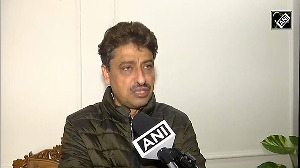
For years, India had two Nobel Peace Laureates of foreign origin living on her soil.
But while one was given the highest honours by the Indian government (including the Bharat Ratna) the other has remained just a refugee.
I have never really comprehended this discrepancy between Mother Teresa and Tenzin Gyatso, the 14th Dalai Lama of Tibet who celebrates his 70th birthday July 6.
Indian monks oppose Bharat Ratna to Dalai Lama
One explanation lies in the September 1959 meeting between Indian Prime Minister Jawaharlal Nehru and the young Tibetan leader in Hyderabad House in Delhi.
The Dalai Lama was seeking India's support for a UN Resolution against the violation of human rights in Tibet by Communist China. Nehru refused, saying a resolution in the UN would not help.
In an interview several years ago, the Dalai Lama told me: "This was his belief. In 1959, I appealed to him, when we decided to raise the Tibetan issue at the UN. He said it is of no use: China is not represented there Pandit Nehru disagreed with our intention to raise the Tibetan issue at the UN; he opposed it, but we decided to raise the question anyhow."
For the past 46 years, India's position has remained the same: "We can't do anything about Tibet, China should not be displeased".
Even after China's treacherous attack on NEFA and Ladakh in October 1962, the Indian Prime Minister wrote to Dr Gopal Singh, a former governor: "It is not clear to me what we can do about Tibet in the present circumstances. To have a resolution in the UN about Tibet will not mean much as China is not represented there. We are not indifferent to what has happened to Tibet. But we are unable to do anything effective about it."
India would not do anything for Tibet (and therefore the Dalai Lama), though the Roof of the World had been for centuries a friendly neighbour who had never created any security problem for India. In fact, during all those centuries, the Tibetan high plateau had been an effective buffer allowing India and China to remain good friends.
During the same encounter of 1959, the Dalai Lama had brought up the problem of education for the Tibetan young refugees. Nehru answered: "The best method to keep alive the Tibetan issue is not to raise the issue at the UN, but to educate properly the Tibetans, to give them proper education."
The Dalai Lama had no choice but to accept, though both aspects were of equal importance for him and his people.
At the end of the interview, the Dalai Lama commented: "One impression about Nehru was that he was not so spiritual minded, unlike Rajendra Prasad."
This perhaps explains why the Prime Minister was not able to grasp the significance of the disappearance of a civilization and culture which had always shared India's eternal values.
Today India's Tibet policy have remains the same: "Education, yes; political support, no."
World peace only through ahimsa: Dalai Lama
Nearly fifty years after the arrival of 85,000 refugees, the Indian government continues to provide educational facilities to Tibetan children, but their parents are not allowed to express their anguish at the happenings in Tibet.
Last month, a news item must have immensely pleased the Dalai Lama: The Central Tibetan Schools for Tibetans have topped this year's class XII schools wise results of the Central Board of Secondary Education. This was announced the CBSE chairman Ashok Ganguly yesterday in New Delhi.
Among the groups of schools, the Central Tibetan Schools with a pass percentage of 93.14% is trailed by Kendriya Vidyalayas with 92.47%.
Last year, the class XII results of the Central Schools for Tibetans recorded a pass percentage of 86 % falling short of just 6 percent to beat Kendriya Vidyalayas who were the leaders last year.
This is a remarkable achievement, especially when one knows the role played by wealth in education today. That Tibetan refugees are able to perform so well is a rich tribute to their leader who has been able to motivate the students and their teachers. Despite not being wealthy, they have done exceedingly well in this competitive examination.
Unfortunately after 46 years, the other part of the Dalai Lama's program has not moved an inch forward.
The Rediff Interview/His Holiness The Dalai Lama
In a way, Nehru was right that the UN resolutions would not help. Despite three UN Resolutions in 1959, 1961 and 1965 (the only one India supported), no progress has been made in the field of human rights abuse in Tibet.
To cite the most prominent example, the young Panchen Lama selected by the Dalai Lama ten years ago is still a prisoner in China.
But where the Indian Prime Minister was wrong, is that in abandoning a peaceful independent nation without a murmur, India's stature amongst the African and Asian countries went down the drain.
All the newly independent countries felt that if India could let down a small nation such as Tibet without even taking a principled stand in the UN, India could not be their leader.
Without Nehru realizing it, this action marked the end of India's influence in the Third World.
In a recent attempt to further please Beijing, the Ministry of External Affairs issued a Joint Statement on the occasion of the April visit of the Chinese Premier Wen Jiabao to India. "The Indian side reiterated that it recognized the Tibet Autonomous Region as part of the territory of the People's Republic of China and that it did not allow Tibetans to engage in anti-China political activities in India," it said.
In the first year of his exile, the lack of support from India did create a dilemma for the Dalai Lama.
When he first visited India in 1956, he had already come to the conclusion that: "one thing was quite obvious, [Nehru] still believed that everything was all right with China. He still believed that by talking to the Chinese, the problem can be solved. That is why he advised that I should go back to Tibet. This shows that he believed that it was possible to engage [Beijing], to deal with China. So, he did not expect that in Tibet there would no room for discussion and that the Chinese would act so brutally."
Three years later, the Dalai Lama left Tibet for good, but still "nothing could be done" by India.
He had then no alternative to turn to the West and more particularly to the United States for support. Thus his Middle Path approach was born. He abandoned his quest for independence of Tibet for only a 'genuine autonomy'.
But what real support can the Tibetans expect from the US? Can the builders of a Guantanamo base be the defenders of human rights in Tibet?
The US Vice-President recently proudly declared that the inmates of the base "live under the tropics, are well fed and have everything they want", but the facts remains that US foreign policy is (and has always been) designed to defend US interests only.
It is therefore doubtful if the current dialogue with the Chinese government could lead very far, even if supported by the US. Unless and until India decides that she can do something about Tibet, no sustainable solution is likely to be found. Meanwhile, the Dalai Lama spends his energies on a third program, communicating his message of love and compassion to the world: My Religion is simple; My Religion is kindness.
Indeed, his life in exile is the story of the struggle of a man for peace; a man who believes that ,"through the history of mankind, solutions achieved through the use of force have inevitably been transitory".
Dalai Lama can't select reincarnate Buddhas: China
This man, that Tibetans venerate as the incarnation of Avalokiteshvara, the bodhisattva of Compassion, knows: "A solution can be genuine and lasting only if and when it is to the full satisfaction of the people concerned."
So, he is waiting, as unfortunately the regime in Beijing has not so far been able to share his belief. In the meantime, the rest of the world has greatly profited from the Tibetan leader's wisdom.
During all these years in exile, his message continues to be the same: each and every man on this earth is entitled to happiness and it is the responsibility of each one of us to act, speak or write in such a way to make this possible. And perseverance, he says, is essential:
No matter what is going on
Never give up
Be compassionate
Work for peace
In your heart and in the world
Work for peace
And I say again
Never give up
No matter what is going on around you
Never give up.
We can only wish that the Dalai Lama's principles of peace, non-violence and justice will one day prevail in this often too violent and unjust world.
Photograph: Emmanuel Dunand/AFP/Getty Images





